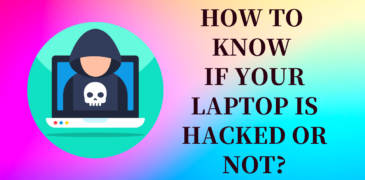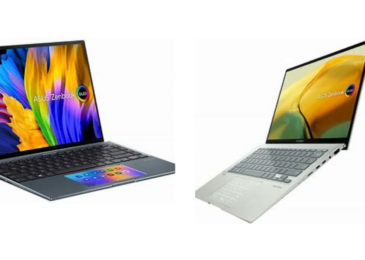Welcome to the digital era, where laptops have become an integral part of our lives, holding a treasure trove of personal information. But have you ever wondered if your laptop is secure from the prying eyes of hackers? With cyber threats lurking in every corner of the internet, it’s crucial to stay one step ahead and ensure the safety of our digital lives. In this article, we will guide you through the signs that can help you determine if your laptop has been hacked or not.
Picture this: you’re sitting in a bustling café, sipping your favorite latte, and typing away on your laptop. Little do you know that someone across the room might be silently infiltrating your system, accessing your confidential files, or even watching your every move. Scary, right? While hacking might sound like something out of a Hollywood movie, it is a real threat that can compromise your personal and financial security.
Sluggish Performance and Unusual Behavior
- One of the telltale signs of a hacked laptop is a noticeable decline in performance. If your laptop suddenly becomes slow, takes longer to start up or shut down, or experiences frequent crashes, it could be indicative of malware or unauthorized access.
- Pay attention to any unusual behavior, such as programs launching or closing without your input, files disappearing or appearing unexpectedly, or system settings changing without your knowledge. These signs may indicate a compromise in your laptop’s security.
Unfamiliar Network Activity
- Monitor your laptop’s network activity regularly. If you notice unusual data transfers or network connections to unknown IP addresses, it could be a sign of hacking.
- Check your network settings and keep an eye on any unexplained network traffic. Unauthorized access to your laptop can lead to the theft of personal information or the use of your device for malicious purposes.
Unexpected Pop-ups and Advertisements
- Pop-ups and advertisements that appear frequently, even when you’re not browsing the internet, can be an indication of a hacked laptop. These unwanted intrusions may contain malware or be a tactic to gather your personal information.
- Install reliable ad-blocking software and keep it updated to minimize the chances of encountering malicious ads. Additionally, a sudden surge in ads or redirection to suspicious websites should be investigated further.
Unexplained Account Activity
- Regularly review your online accounts for any unexplained activity, such as unfamiliar login attempts, changes in passwords, or suspicious transactions.
- If you notice any unauthorized access to your accounts or receive emails about password resets that you didn’t initiate, your laptop’s security may have been compromised. Take immediate action to secure your accounts and investigate the source of the breach.
Antivirus and Firewall Alerts
- Pay attention to any antivirus or firewall alerts on your laptop. These security tools are designed to detect and prevent malicious activities.
- If your antivirus software frequently detects threats, despite regular scans and updates, it could indicate a compromise. Similarly, if your firewall regularly notifies you about unauthorized attempts to access your system, it is crucial to investigate further.
Unexpected Battery Drain and Overheating
- Noticeably reduced battery life and excessive overheating are potential signs of a hacked laptop. Malware or unauthorized processes running in the background can strain system resources, leading to increased power consumption and overheating.
- Monitor your laptop’s battery performance and temperature regularly. If you observe significant deviations from normal behavior, it is advisable to investigate for potential security breaches.
Strange Email and Social Media Activities
- Hacked laptops can be used to gain unauthorized access to your email and social media accounts. Look out for unusual email behavior, such as emails being sent from your account without your knowledge or unexplained password resets.
- Similarly, if your social media accounts start posting or messaging content that you did not create, it could be an indication of a breach. Be vigilant about these activities and take immediate steps to secure your accounts.
Also read:
Are Old Laptops a Cyber Security Liability?
How To Minimize The Risk Of Social Attack Cyber Crime
How to Secure Your Home Internet Network
Spyware: Everything You Should Know
FAQs
How can I tell if my laptop has been hacked?
Signs that your laptop may have been hacked include sluggish performance, unusual behavior such as programs launching or closing on their own, unfamiliar network activity, unexpected pop-ups and advertisements, unexplained account activity, antivirus and firewall alerts, excessive battery drain and overheating, and strange email and social media activities.
What should I do if I suspect my laptop has been hacked?
If you suspect that your laptop has been hacked, it’s important to take immediate action. Disconnect from the internet to prevent further unauthorized access. Run a full scan using your antivirus software to detect and remove any malware. Change your passwords for all online accounts, especially if you suspect that they may have been compromised. Update your software and operating system to the latest versions, as these often include security patches. Consider consulting a professional or reaching out to your IT department for assistance if needed.
How can I prevent my laptop from being hacked in the first place?
Establishing a strong defense against hacking attempts begins with cultivating good cybersecurity habits. Ensure your operating system and software stay up to date by promptly installing the latest security patches. Employ robust and distinct passwords for each online account, and enable two-factor authentication whenever available. Exercise caution when interacting with unfamiliar links or downloading files. Employ a reputable antivirus program and ensure regular updates. Avoid connecting to unsecured public Wi-Fi networks, and consider reinforcing your security with a virtual private network (VPN). Safeguard your digital presence with these essential cybersecurity practices.
Can a hacked laptop lead to identity theft?
Yes, a hacked laptop can potentially lead to identity theft. Hackers may gain access to your personal information, such as usernames, passwords, social security numbers, and financial details. With this information, they can assume your identity, make unauthorized transactions, and wreak havoc on your financial and personal life. It is crucial to take immediate action if you suspect your laptop has been hacked to minimize the risk of identity theft.
Should I contact law enforcement if my laptop is hacked?
While it is not always necessary to contact law enforcement immediately, it is advisable to report any hacking incidents to the relevant authorities. They can provide guidance and support, and your report can contribute to a larger investigation if necessary. If you believe that sensitive personal or financial information has been compromised, contacting your local law enforcement or cybercrime reporting agency can be a wise decision.
Conclusion
In a world where laptops have become our digital lifelines, ensuring their security is of paramount importance. We’ve explored the subtle signs that can help you determine if your laptop has been hacked or not. Remember, hacking is not just a plotline in a movie; it’s a real threat that can compromise your personal and financial well-being.
By staying vigilant and paying attention to the signs, you can take proactive steps to protect yourself. If you notice a decline in performance, unusual network activity, unexpected pop-ups and advertisements, or unexplained account activity, it’s time to investigate further. Your antivirus software and firewall can be your allies in detecting potential threats, so don’t ignore their warnings.
So, the next time you’re enjoying that cup of coffee at a café, typing away on your laptop, rest assured that you are armed with the knowledge to detect and prevent hacking attempts. Stay one step ahead of the hackers, and keep your laptop and personal information safe and secure in this digital age.







